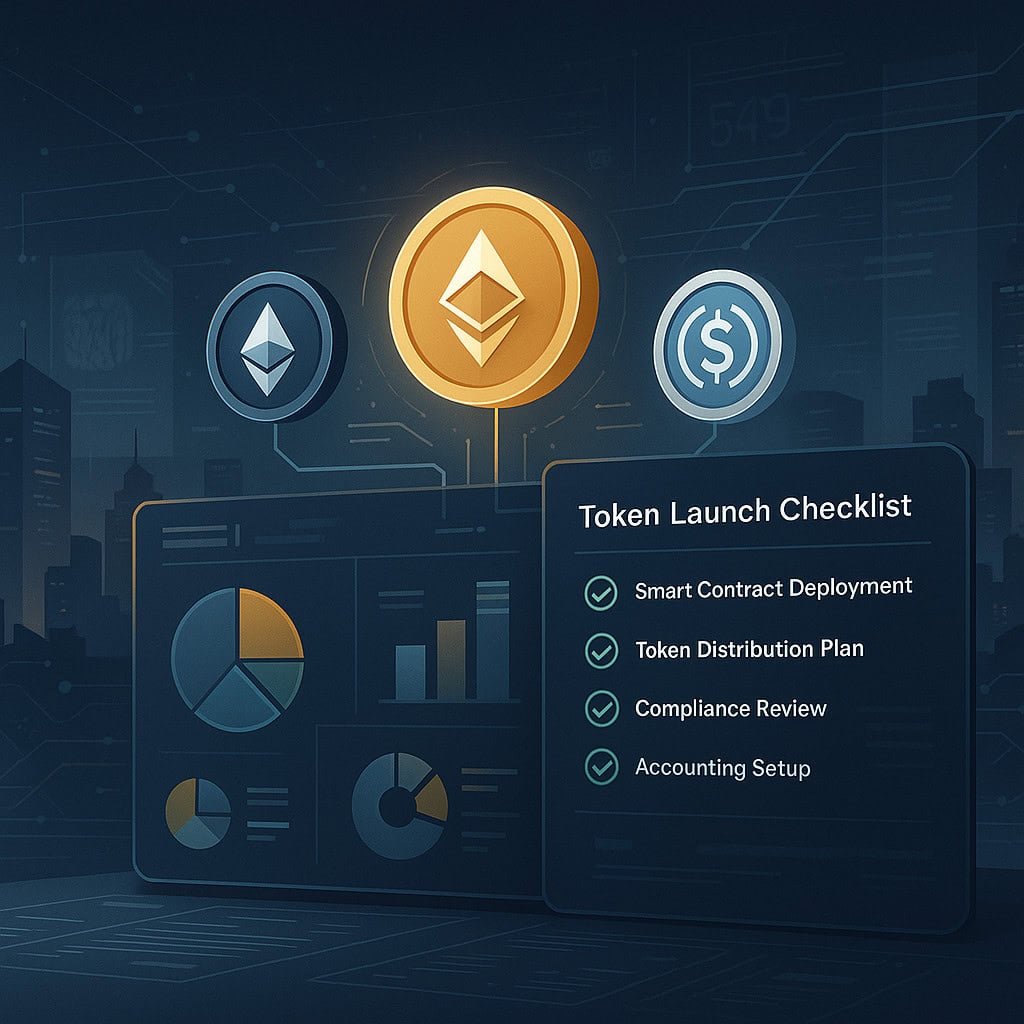Last Updated on April 5, 2025 by Patrick Camuso, CPA
Planning a token launch for your Web3 project involves much more than simply creating and distributing your own crypto token. Whether you are preparing a Token Generation Event (TGE) or aiming to introduce new tokens to the crypto market, understanding the tax, accounting, and legal landscape is crucial.
A token launch is not just a marketing milestone; it represents a complex financial event that can significantly influence your project’s future success.
Tokens are often introduced to the public through fundraising campaigns or sales on cryptocurrency exchanges, and a comprehensive marketing plan is essential to increase awareness, engagement, and adoption.
This guide is designed to help business owners, core team members, and potential investors navigate the essential financial strategies and compliance considerations necessary before entering the digital economy with new crypto tokens.
Key Takeaways
Launching a token involves more than technical development; it requires careful planning around entity structure, token classification, tax compliance, and transparent reporting. To recap:
- Establish your legal entities before the Token Generation Event.
- Classify tokens accurately as revenue, deferred revenue, or capital.
- Document all intercompany token transfers thoroughly.
- Use 83(b) elections to optimize tax treatment of token grants.
- Maintain audit-ready records with crypto-native accounting tools.
- Collaborate with crypto-native legal, accounting, and valuation experts.
- Stay informed on regulatory changes affecting blockchain networks.
- Design tokenomics that align incentives with compliance.
Launching a Token? Start Here First

A token launch, or Token Generation Event (TGE), is when a project officially issues its crypto tokens to users, investors, or the public. These tokens serve various purposes: governance tokens allow participation in network decisions, while utility tokens grant access to services within a blockchain network. Smart contracts automate token creation, transfer, and management, ensuring secure transactions.
Launching popular crypto tokens involves complex tax, accounting, and legal considerations. Missteps can lead to audits, loss of founder equity, or unexpected tax liabilities. Proper classification of tokens, as revenue, deferred revenue, or investment capital, affects financial reporting. Regulatory compliance is crucial in the evolving landscape of digital currencies and decentralized finance.
Security measures are vital to prevent fraud and protect the project’s reputation. Building a community before launch fosters trust and engagement. Providing liquidity through exchange listings enhances token usability. Understanding these financial, legal, and operational factors is key to a successful token launch and sustainable growth in the blockchain ecosystem.
Set the Right Legal & Entity Structure

One of the most critical decisions when launching tokens is establishing the appropriate legal and entity structure. Most successful token projects adopt a dual-entity model to balance operational efficiency with legal protection. This typically involves a U.S.-based operating company, often a Delaware C-Corp or LLC, that handles development, fundraising, and day-to-day operations. Alongside this, an offshore token-issuing entity is created in jurisdictions such as the British Virgin Islands, Cayman Islands, or Panama. This offshore entity isolates token liabilities from operational risks, protecting the operating company and its founders.
Engaging with investors transparently throughout this process builds trust and supports successful fundraising efforts. The separation of entities also facilitates smoother token sales and compliance with international regulations, which is especially important given the global nature of blockchain networks. However, setting up this structure requires early action. Collaborating with crypto-native legal professionals and a blockchain development company before formation can save considerable costs and mitigate risks. Attempting to restructure entities after the token sale or during token distribution can be expensive and complicated.
Clear communication strategies are essential to avoid misunderstandings and legal repercussions during the launch.
Patrick Camuso, CPA, “Founders often underestimate how much the entity structure impacts long-term tax exposure. Getting it right upfront is the best investment you can make.”
Working with legal professionals experienced in blockchain systems and security token offerings ensures your project meets both U.S. and international compliance standards, creating a solid foundation for future growth.
Classify Tokens Correctly: Revenue or Deferred Revenue?
Proper classification of tokens is essential for accurate accounting and tax reporting. Tokens with immediate utility, such as those granting instant access to a blockchain platform or network services, are generally recognized as revenue at the time of sale. Conversely, tokens that provide benefits or access at a future date are often classified as deferred revenue, reflecting the obligation to deliver services later. How you distribute tokens, whether through airdrops, initial coin offerings (ICOs), or security token offerings (STOs), also influences their classification.
Governance tokens and security tokens require more nuanced treatment. Governance tokens may not represent immediate revenue but instead confer voting rights or influence over network decisions, complicating their accounting classification. Security tokens, which signify ownership of a company or asset similar to traditional shares, must be treated accordingly in financial reporting and comply with securities laws.
To avoid misreporting, it is advisable to engage valuation specialists familiar with tokenomics and the unique features of crypto tokens. These experts can help determine the fair market value (FMV) of your tokens and ensure your token sale aligns with accounting standards and regulatory expectations. Accurate classification supports transparency and builds confidence among potential investors and regulatory bodies alike.
Token Transfers Between Entities: Avoid Tax Traps
When tokens are transferred between the offshore issuer and the U.S. operating company, these movements can trigger taxable events. The Internal Revenue Service (IRS) often treats such transfers similarly to intellectual property licensing or asset sales, requiring an arm’s-length valuation to establish fair market value. Without proper documentation and valuation, your project could face unexpected tax liabilities or penalties.
To mitigate tax risks, it is crucial to maintain comprehensive documentation, including intercompany agreements specifying terms and valuations. Utilizing crypto-native accounting tools that track wallet activity and timestamped valuations can support audit-grade records. Additionally, implementing token lockups for a minimum of one year from the date of the token launch can help ensure compliance and stability, reducing the risk of market manipulation or premature sales. Always apply transfer restrictions on tokens for at least one year from the launch date to further enhance compliance and investor confidence.
Properly managing token transfers between entities is a key step in maintaining legal compliance and protecting the project’s financial health.
Cross-Border Tax Exposure
Operating through offshore entities does not exempt founders or the project from U.S. tax obligations. Complex tax provisions such as Controlled Foreign Corporation (CFC) rules, Subpart F income, and Global Intangible Low-Taxed Income (GILTI) can subject U.S. founders to tax on offshore profits generated by token projects. These regulations are designed to prevent tax avoidance and require careful navigation.
Coordinating with cross-border legal and tax advisors is essential to understand these rules and minimize personal liability. Awareness of how blockchain networks interact with international tax regimes will help your project maintain legal compliance and optimize tax efficiency. Ignoring cross-border tax exposure can lead to costly penalties and jeopardize your project’s future.
Token Grants & the 83(b) Election
For projects issuing tokens as grants or incentives, such as rewards for early users, contributors, or loyalty programs, tax timing is a critical consideration. Without filing an 83(b) election, tokens are typically taxed at vesting, which may occur when the token’s fair market value is higher, resulting in a larger tax burden.
Filing an 83(b) election within 30 days of the grant allows the recipient to be taxed on the token’s value at the time of grant, which is often lower. This election shifts potential future appreciation into long-term capital gains, which are usually taxed at a more favorable rate. This strategy can significantly reduce the tax impact for recipients and encourage participation in token projects.
Project teams should educate recipients about the benefits and deadlines associated with the 83(b) election to maximize incentives while maintaining compliance.
Maintain Audit-Grade Records
Accurate and transparent record-keeping is fundamental to managing a successful token launch. Document all token issuances, grants, transfers, and distributions meticulously. Employing crypto-native accounting software that tracks wallet activity, grant schedules, and valuation timestamps ensures compliance and facilitates audits.
Thorough research before investing in new digital assets is crucial due to the extremely volatile nature of the crypto market. Maintaining audit-grade records not only builds investor trust but also supports ongoing regulatory compliance as blockchain systems and cryptocurrency transactions face increasing scrutiny worldwide.
Surround Yourself With Crypto-Native Experts
Launching tokens in the complex crypto market requires specialized expertise. Engaging CPAs who understand the nuances of token treatment, valuation specialists experienced with tokenomics, and legal counsel familiar with global token launch regulations is essential. Monitoring community feedback, market developments, and token performance post-launch helps projects adapt to evolving conditions.
Partnering with a blockchain development company that offers tailored development services can streamline the process. These experts help design tokens with unique features that solve specific problems, ensure legal compliance, and optimize tokenomics for future growth. Most cryptocurrencies are developed by teams rather than individuals due to the complexity of the process, making collaboration with skilled developers indispensable for success.
Stay Ahead of Regulatory Change
The regulatory environment for cryptocurrency and blockchain technology is continually evolving. Agencies like the IRS and SEC frequently update rules affecting token launches, security token offerings, and digital asset taxation. Legal and regulatory obligations such as Know Your Customer (KYC) and Anti-Money Laundering (AML) requirements vary depending on the project’s location and must be strictly adhered to during a token launch.
The SEC argues that nearly every token should be registered under U.S. securities laws, prompting builders to take compliance seriously and integrate it into their project planning. Public token sales to U.S. persons for fundraising purposes are considered a significant legal risk and should be avoided to ensure adherence to securities regulations. Engaging in public token sales to U.S. persons for fundraising purposes is antithetical to compliance with U.S. securities laws and can expose projects to severe legal consequences.
Stay informed by subscribing to regulatory alerts, attending industry webinars, and working with advisors who monitor these changes. Proactive compliance helps your project avoid costly penalties and adapt to new frameworks in decentralized finance and digital currencies.
Build Tokenomics With Compliance in Mind
Token design decisions have direct implications for tax and accounting outcomes. For example, staking rewards distributed to users may be considered taxable income, while treasury payouts could require reporting on W-2 or 1099 forms. Designing your tokenomics to balance incentives for users with regulatory requirements enhances the value and sustainability of your token project.
Projects should pursue decentralization as their primary objective to mitigate regulatory risks and align with the ethos of blockchain technology. Well-constructed tokenomics not only attract users and investors but also ensure long-term compliance and growth within the crypto ecosystem. Projects should always pursue decentralization as their primary objective to reduce regulatory risks and align with the core principles of blockchain innovation.
Token-Focused Financial Reporting
Clear financial reporting that separates token revenue from core operations is vital. Providing wallet-level transparency and detailed reporting builds confidence among potential investors and regulators alike. Such practices reflect best-in-class governance and demonstrate your project’s commitment to security, compliance, and accountability, key factors in the competitive crypto market.
Frequently Asked Questions
What does it mean to launch a token?
Launching a token refers to the process of creating and distributing a new crypto token on a blockchain platform, often through a token sale or initial coin offering. Numerous new digital currencies are introduced regularly, reflecting rapid innovation in the blockchain space.
How to do a token launch?
A token launch involves planning your tokenomics, establishing legal entities, ensuring tax compliance, and executing the token sale on suitable exchanges or liquidity pools. Utilizing existing blockchain platforms can simplify the process for those with limited programming knowledge.
Which crypto coin is launching soon?
Stay updated through crypto market news and token launch platforms to discover upcoming tokens. Each new cryptocurrency offers unique features and potential benefits for investors, making thorough research essential before investing.
How much does it cost to launch a token?
Costs vary depending on legal fees, development services, compliance, and marketing, ranging from tens of thousands to millions of dollars. The cost of creating a cryptocurrency depends on customization and technical requirements. Creating a cryptocurrency typically requires significant programming knowledge and experience, which can also influence the overall cost.
Is it legal to launch a crypto coin?
Yes, but legal compliance with securities laws, tax regulations, and exchange commission rules is mandatory.
How hard is it to launch a token?
Launching a token requires navigating technical development, legal frameworks, tax considerations, and market dynamics, making it a complex process.
How to launch a token legally?
Work with legal professionals experienced in blockchain systems and security token offerings to ensure compliance.
How do I launch a crypto?
Partner with a blockchain development company, define your tokenomics, secure financing, and comply with regulatory requirements.
How to find new tokens before they launch?
Follow crypto market news, join blockchain communities, and monitor token project announcements on social media and forums. New cryptocurrency listings often present new crypto pairs and investment opportunities.
Camuso CPA Guides You From Launch to Liquidity
Since 2016, Camuso CPA has been an ideal partner for Web3 startups navigating the complexities of token launches, audits, and cross-border structuring. Combining deep blockchain fluency with elite accounting strategy, Camuso CPA helps protect and grow founder wealth amidst the extremely volatile cryptocurrency market.
If you are planning to launch your own blockchain platform or digital assets, expert guidance is invaluable to avoid common pitfalls and maximize your investment opportunity.
Next Steps:
- 📞 Schedule a Private Consultation with Camuso CPA
- 📅 Download Our 2025 Crypto Tax Survival Checklist
- 📜 Explore Our Comprehensive Guide to Cryptocurrency Taxation
Launching tokens successfully requires more than technical innovation, it demands strategic financial and legal planning to thrive in the evolving digital economy. With the right partners and knowledge, your token project can unlock new opportunities and create lasting value in the world of blockchain technology. Creating a detailed roadmap can help convey progress and build investor confidence, especially for projects without an explicit use case.






